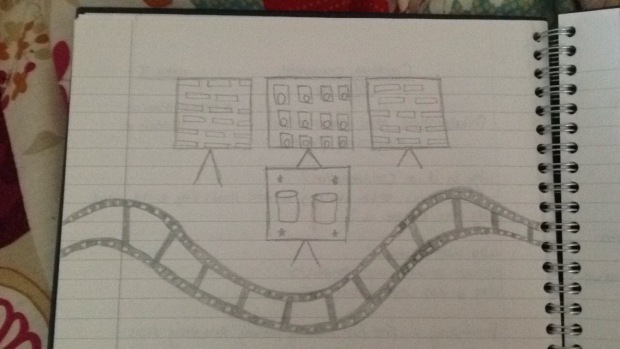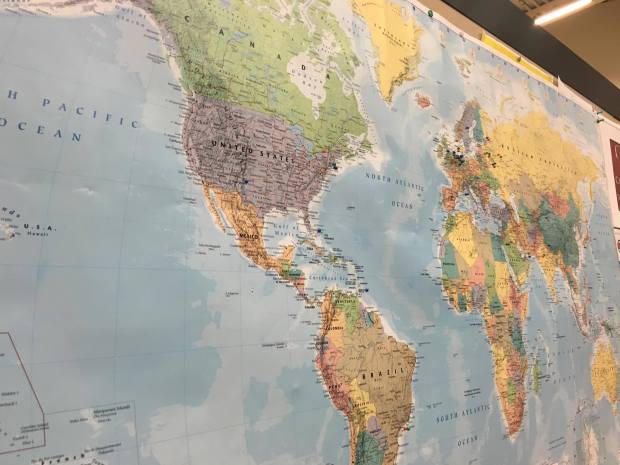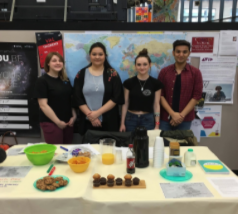According to Aiim,
“Collaboration enables individuals to work together to achieve a defined and common business purpose, It exists in two forms:- synchronous, where everyone interacts in real time and asynchronous, where the interaction can be time – shifted.”
Sunday 7th Feb.
We had an idea of a social experiment. The first ideas revolved around honesty and opinions. I researched two experiments that I found interesting and that I remembered from psychology a few years ago: the Stanford prison experiment and the Bobo the doll experiment.
We still don’t have a name but we are trying to come up with any ideas we do have. So the concept behind the honesty/ opinion experiment, at first was going to be done via a booth. We were then going to ask the public a few basic questions and then we would judge them by their appearances, and their answers to those simple questions. Questions like favourite animal, one place in the world you want to travel, favourite colour and best beauty item. Nothing too deep that can give away their personality. We wanted to go into Central London, away from university students/ people we know. It would be too easy that way. We took the inspiration from the Dove beauty campaigns.
Then during the third week, we slightly altered the experiment that we are going to do. Still based on honesty/ opinion, we are going to have two jars, one containing answers to a fear question and one containing answers to another question. We were thinking ‘What one thing do you live for?’ as well as the fear one being ‘What is your biggest fear in life?’ And then we are going to hopefully get a few photos from the participants and put all three, photos, and both set of answers on some sort of board- 3 separate ones. And we were also going to create a mini documentary about it as well.
We want to make it bright and colourful, and we want it to show people that there’s nothing wrong about being honest about yourself. We were originally going to ask questions about looks and personality- What do you like about yourself etc. We want it to be simple in show, but we want the affects to be huge.

This is how I see it. Top left: Answers to one Question. Top middle: Photos of participants. Top Right: Answers to another Question. Middle: Photo of the two jars we are using, containing the answers. And then Bottom: Film reel representing the documentary we want to do.
Wednesday 10th Feb.
After talking to my group, we decided we wanted to do something based on how people could use it, and that they could take away something from what we create: a social statement or something unexpected.
I have a list of a few social issues that we could base our collaboration piece around:
-Animal Cruelty
-Religion & Terrorism
-Poverty, Human Rights and Money (Rich V Poor)
-Gender Equality, Racism and Homophobia
-Crime and Punishment (Justice System)
-Bullying
-Education & Jobs/ Careers
-Fitness and Health
I viewed a website which featured several inspirational social issue adverts:
Originally we wanted to do our topic around being honest and truthful to ourselves. I still think that honesty and being truthful about ourselves is still an important one. One piece of research I found was a youtube channel: The Jubilee Project. This interested me as it was similar to the Dove adverts in a way, but felt more personal as it was done by one guy (and his camera crew), but it felt like as we were watching it, we could somehow relate to them. He was in our homes, not talking to a camera but to us.
Thursday 18th Feb.
When we meet, we tend to have these new ideas that we want to add, or at times we just change the entire outcome of what we want to do. This time, we’ve got another idea and this time this is it. Although we may add to it, this is the initial plan/ idea. We want to focus on identity, especially in the world of globalisation.
We have a primary question which is Why is there a disparity of identity between birthplace and places where individuals feel a sense of belonging? Our secondary questions include:
What factors do individuals use to determine their sense of belonging in a globalised world? Why? Where you are born is innate. Does where you were born define you as a person? What makes you who you are? Is it where you were born; is it the culture you grew up in? Is it the media you have been exposed to?
We have branched our research and decided to focus on social experiments, as before, but using traditional media as well as social media. We will look into current events, discussions of personal and external experiences in topics like globalisation with other people. We will look into the nature of things and the sociology of the human condition.
Our main idea is this: We want to concentrate on identification and representation. We will collect certain data from the public asking them to pin point on a map, asking where they were born and where they are from. We want to know what the difference is between birthplace and where someone feels like they are ‘from’. We will offer goodies, like donuts, tea, coffee and other beverages.
We want to expand as much of this research as we can. We don’t want to stick to one particular place, we are thinking of going into Central London as well as other University campuses. At the end, we hope to achieve some answers to our individual hypotheses. We will organise the date we have in points on a map which we will combine with videos, responses as well as photos which we will take (with permission) throughout the experiment, and place them in some sort of video installation. This then can be shown in an article like what Vice does, or shown in a public space, for public interest.
Wednesday 24th Feb.
We received some decent feedback from Clare about our proposal, we just need to get some sources and research more about global identity, and to see if anyone else has tried to do what we are doing, and to see how far this particular topic has been spoken about, and where it was started.
I found an interesting TED Talks video | Pico Iyer: Where is home? It fascinated me on how accurate it all is, how he talks about identity in the way we feel comfortable, where we feel like we belong. He asks himself where am I from and then answers it in a different way. People would assume he is Indian which in fact he clarifies that he is not, as he has never been to India and cannot speak the language. (Yes his parents are from there). He mentions how he was born in England but moved after he graduated from University. But what I found most interesting is out of all the places he could identify with, he identifies mostly with Japan, and he said he would call himself Japanese if he could, and then he says how he doesn’t think they would let him become one, and become part of their culture. From one man who people would assume is Indian, who actually spends more time in Japan intrigues me to the basis of the fact that anyone can live anywhere, can be born in once place and end up living on the other side of the world, and be so much happier.
You don’t chose where you are born, but you can chose where you live.
Wednesday 9th March.
We carried out our research in the forum of the Harrow campus. We had a table and we provided food for the public who helped particiapte with our social experiment. It started off slow. We were there from 1pm until 5pm. Our aim was to get 50 participants and we ended up with 58 which was an amazing achievement. We asked four questions:
-What’s your first name?
-Where were you born?
-Where have you lived the longest?
-Where do you identify with the most in the world?/ Where do you feel like you belong?
As we were going along, we would pin point each answer on to large map, which we then realised we didn’t need to do this until the final presentation, but it gave us an understanding of how it could look like in the end.

The world map we are using for our final presentation, along with a sample of pins that represent the individual’s answers
As we recorded down the answers, we also asked why they felt like a certain place is where they felt they belonged. We had a few interesting answers.We also recorded the majority of the experience via film, which Jess is now editing and then we’ll put it together and present it at the presentation along with the map.
Wednesday 16th March.
Today we each decided on our ‘role’ for the next week before the presentation on the 23rd. We discussed about a possible article for Vice in where we would include the time lapsed film along with a few photos of the individuals who took part in our research. I am (as my role) currently writing up a draft article where a few responses from the questions will feature. I rarely look at Vice so this is new to me in terms of format and the way they write their articles, but it’s good that I get some sort of role where I feel comfortable in. I’m not writing the whole article just a small area.
We also discussed about doing a small voice over within the film, explaining what is going on and what we are seeing in the film itself. Only one person will be needed for this and I think Laura is doing this particular task as the PR student, she is the most confident at speaking publicly.
It’s getting a bit stressful now with only a week to go. I didn’t realise how fast 10 weeks would go, but it has flown by with a click of the fingers. We’ve done the best we could for what 10 weeks is really…. not a lot basically. I really hope we do well and that it doesn’t go ‘tits up’ as some may say. During class today, Laura wasn’t here for the most of it and (as she normally takes the leader role), I felt like I had to step in and i’m not always great at that… or speaking on behalf of a group. I hope that when it comes to the presentation i’ll be a lot more professional and just give it my all.
Wednesday 23rd March.
Presentation day. I was quite disappointed in myself and the group. I felt like preparing for it was very rushed. We wanted to rehearse a few times, or at least once to make sure we all knew what we were going to say and how it was going to look like, but we didn’t get a chance because somehow we were all over the place right before we were suppose to be in the room. Personally I was so nervous about the presentation, seeing as it was worth half of our grade I wanted it to be perfect. But one good thing cam out of it, we have name now. We are 4 in One. The end results didn’t end up being how we planned it to be.
The video: we never added the voice over because we felt like it was easier/ better if Laura were to just explain it there and then what we were doing, and she was worried she would repeat what has been said in the video & there in person.
The map: we had spent in advance a good hour or two going through all 58 participants answers, separating them into the three categories which had their own pins. We then added another three coloured pins for the area of London. Each pin would represent 5 people in London, one would be for where they were born, one would be for where they lived the longest and the other one would be for where they feel they belong- all being an area in London.
The article: I printed off two copies one for Clare and the other for Matt so they could have read of the draft for the Vice article.
We also created a leaflet that gave a summary of what we did for our collaboration, along with a key of the pin colours and a bit about ourselves, where we feel like we belong in the world. We printed a few off and gave one to each presentation group.
Wednesday 30th March.
I felt like I couldn’t appreciate the module as much as it was only 10 weeks and there was so much to do in 10 weeks, I felt like if I took a breathe one week would be gone. I was very nervous at first because I find it quite hard to get into groups straight away and crack on. I was glad that we had the time to get to know each other firsthand and understand each others strengths and weaknesses, and where we all came from course wise. I’m the journalism student so i’m always behind the screen writing the essays and researching from book to book in the library.
My weakness is definitely public speaking and presentations, I cannot go up there whether that be on my own or in a group, without shaking and feeling like my throat is going to close up. I felt like the word ‘collaboration’ was used a lot during the 10 weeks of Creative Encounters, by the end of it I feel like I never want to hear that word again, not for a while anyway.
I do like working in a group, but when you are trying to concentrate and get the work done, and there’s that one person who refuses to do anything, it does get a bit frustrating and infuriating. I feel as though I wish I could’ve picked who I worked with, but most of the time we were all fine and we all got on wonderfully.
I’m not a fan of having such a broad brief, it’s a lot harder I think than just writing 2000 words on a particular topic- because of the amount of research you have to put in it as well as thinking about what you have to do, and how you are going to go about and actually do it.

Jess, myself, Laura and Kush
THE PRESENTATION:
Creative Encounters Collaboration– Presentation
Feedback from the group presentation: In general, I am very disappointed with the grade we as a group have received for the presentation. Despite feeling like a nervous wreck at the time, I thought me personally did alright. I introduced us as a group, talked about my thoughts on Identity as well as mentioning the main research I did, which I found very interesting.
What I found quite insulting is the comment written for the marking criteria “Level of innovation in the collaborative discoveries and explorations”– “You touched on a research question that seems to fascinate your generation however, the idea could have been explored in a more creative and innovative way”. The thing I found quite annoying is the fact how this module was to show our creativeness through collaboration, yet even though we did our absolute hardest, we still got judged for not being creative enough. I don’t get how that is even possible.
The level of risk taking I think could partially be my fault, as I think I was the one to hold back the group on that area. Out of the four of us, I think I tend to stay in my comfort zone the most, although I still feel like I did achieve more than I would if I was to just work my own. For example, when speaking to strangers, I would personally see that as a struggle in the world outside. Asking them questions, and seeing if they have some spare time to help out with a project would normally end in rejection and failure. To have asked (in a group) 58 people our questions, I think was such an achievement, especially as I did quite a few of them on my own, without any help from the other three in my group. As well as the presentation, we have also created the short film which we have handed into the registry.
I take on board all the comments in general that have been given to us and to me, I do think it could’ve been done better, but for what we had, a mere 10 weeks and with only a £15 budget per person, it isn’t like we could’ve put on an exhibition or anything. I do wish that as a group, we could’ve come together a lot more than we did, and to communicate as much of our own ideas than hiding back. I think Laura took some sort of lead role, being the PR student I think it was only natural, which did help us to form together as more of a group. Without any leadership at all, I think we would’ve crumbled and fallen before we even started. I do sometimes like to take the leader role when I can, but with this topic and with the brief being as broad as it was, it was a lot harder to come together with ideas, and say ‘right let’s try this’, or ‘let’s do this today’. Each of us brought something different, new and exciting to the collaboration, which is what 4 in one represents. 4 individual beings coming together as one.